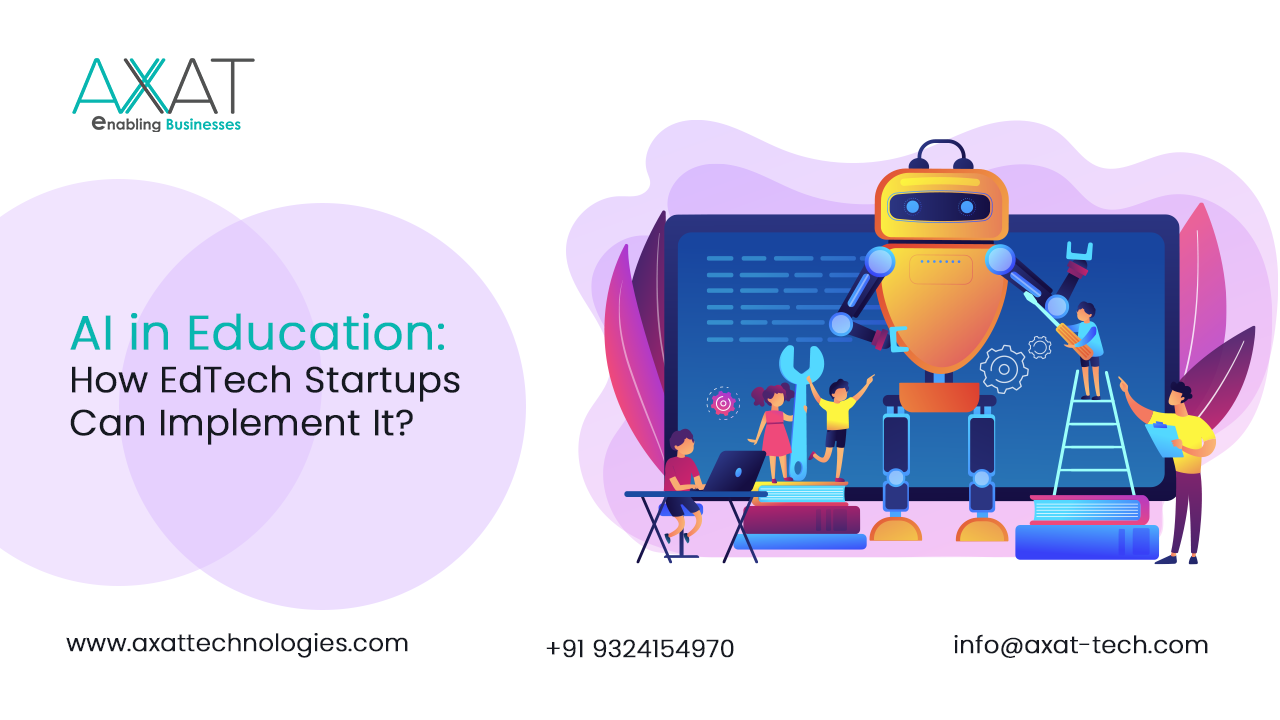In the ever-evolving landscape of education, technology continues to reshape traditional paradigms, and Artificial Intelligence (AI) stands at the forefront of this transformation. EdTech startups are uniquely positioned to harness the power of AI to bring about innovative changes in the way we teach and learn. Here's a comprehensive guide on how EdTech startups can effectively implement AI in education.
1. Identifying Educational Challenges
The first step for EdTech startups is to conduct a thorough analysis of the existing educational ecosystem. Identify challenges and gaps in traditional methods. Whether it's personalized learning, student engagement, or administrative efficiency, pinpointing these areas will serve as a foundation for your AI implementation strategy.
2. Collaboration with Educators and Institutions
Successful integration of AI in education requires collaboration with educators and institutions. Engage in dialogue with teachers, administrators, and educational experts to understand their needs and challenges. By involving them in the development process, startups can ensure that their AI solutions are practical, effective, and aligned with the realities of the classroom.
3. Personalized Learning Algorithms
One of the most promising applications of AI in education is the development of personalized learning algorithms. EdTech startups can use AI to analyze student data, learning styles, and performance metrics. This information can then be utilized to tailor educational content, providing a unique and optimized learning experience for each student.
4. Adaptive Learning Platforms
Create adaptive learning platforms that dynamically adjust the difficulty and pacing of lessons based on individual student performance. These platforms ensure that students receive the right level of challenge, keeping them engaged and motivated to learn.
5. AI-Powered Content Creation and Curation
AI can assist in content creation and curation. EdTech startups can leverage AI algorithms to generate educational content, quizzes, and assessments. Additionally, AI can help in curating relevant learning materials, ensuring that students have access to up-to-date and tailored resources.
6. Intelligent Tutoring Systems
Develop intelligent tutoring systems powered by AI to provide personalized support to students. These systems can offer instant feedback on assignments, answer queries, and adapt their guidance based on the individual learning pace and preferences of each student.
7. Gamification for Enhanced Engagement
Infuse gamification elements into educational content to enhance student engagement. AI algorithms can dynamically adjust game difficulty levels, ensuring an optimal balance between challenge and enjoyment. Gamified learning experiences make education more interactive and enjoyable.
8. Automated Assessment and Feedback
Implement AI tools for automated assessment and grading. This not only reduces the burden on teachers but also provides students with instant feedback, allowing them to understand their strengths and areas for improvement in real time.
9. Administrative Streamlining
AI can streamline administrative tasks within educational institutions. EdTech startups can develop AI solutions for automating enrollment processes, managing student records, and optimizing resource allocation. This contributes to overall efficiency and allows educators to focus more on teaching.
10. Continuous Monitoring and Improvement
Education is a dynamic field, and AI implementations should reflect that. Establish mechanisms for continuous monitoring and improvement. Regularly gather feedback from users, analyze performance metrics, and iterate on your AI solutions to address emerging needs and challenges.
Benefits of AI in Education
For Teachers:
1). Personalized Teaching Strategies:
AI empowers teachers with tools that analyze individual student learning patterns. This allows educators to tailor their teaching strategies, providing personalized and targeted support to each student. By understanding the unique strengths and challenges of their students, teachers can optimize the learning experience.
2). Time Efficiency:
Automated grading and assessment tools powered by AI alleviate the administrative burden on teachers. This time-saving aspect allows educators to focus more on creating engaging lesson plans, fostering student interaction, and providing valuable one-on-one assistance.
3). Data-Driven Insights:
AI generates data-driven insights into student performance. This information equips teachers with a comprehensive view of each student's progress, enabling them to identify areas that need attention or additional support. Informed decision-making becomes a cornerstone of effective teaching.
B. For Students:
1) . Personalized Learning Paths:
AI facilitates personalized learning experiences by adapting content and pacing to individual student needs. This tailoring ensures that students receive the right level of challenge, promoting a deeper understanding of subjects and maintaining engagement.
2). Immediate Feedback:
Automated assessment tools provide instant feedback on assignments and tests. This rapid feedback loop allows students to grasp concepts more effectively, address misconceptions promptly, and actively participate in their own learning journey.
3). Enhanced Engagement through Gamification:
Integrating gamification elements into educational content using AI makes learning more interactive and enjoyable for students. Games that adjust difficulty levels based on performance not only reinforce learning but also foster a positive and engaging atmosphere.
C). For Parents:
1) . Real-Time Progress Monitoring:
AI in education enables parents to monitor their child's progress in real-time. Through online platforms and dashboards, parents can access data on academic achievements, areas for improvement, and overall participation in school activities.
2). Enhanced Communication:
AI-powered communication tools facilitate seamless interaction between parents and teachers. This streamlined communication ensures that parents stay informed about their child's educational journey, allowing for proactive involvement and support.
3) Support for Learning at Home:
AI-driven educational apps and resources offer supplementary support for learning at home. Parents can leverage these tools to reinforce classroom teachings, providing an additional layer of educational support outside school hours.
Final Thoughts
Shaping the Future of Education As EdTech startups embark on the journey of implementing AI in education, the potential for positive transformation is immense. By understanding the nuanced needs of educators and students, leveraging personalized learning approaches, and continuously refining AI applications, these startups have the opportunity to shape the future of education. The integration of AI isn't just about technology; it's about creating a more adaptive, engaging, and effective learning environment for students worldwide. As we move forward, the synergy between technology and education holds the key to unlocking new frontiers in learning and teaching.
